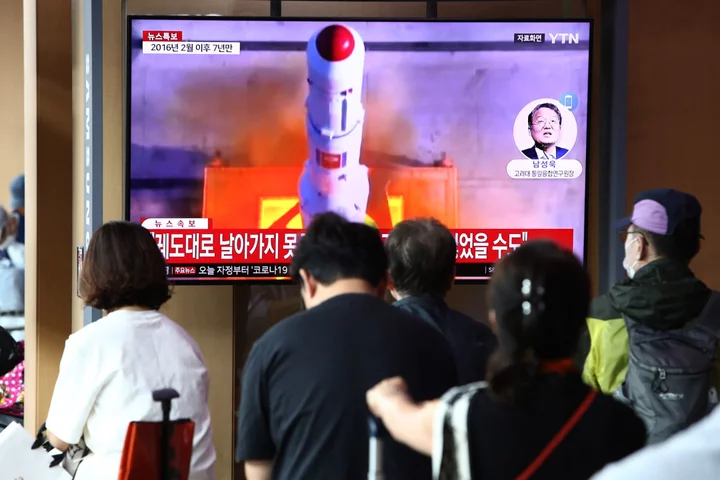North Korea test-fired two short-range ballistic missiles Thursday in its first such launch in about two months, which came after it failed in late May to put a spy satellite into orbit.
The missiles were launched as the US and South Korea ended live-fire drills this week near the border with North Korea, which were overseen by South Korean President Yoon Suk Yeol and drew the ire of Kim Jong Un’s regime. Pyongyang’s official Korean Central News Agency quoted a Defense Ministry spokesman as denouncing the military exercises and issuing a threat, in a dispatch that coincided with the launch.
“Our army strongly denounces the provocative and irresponsible moves of the puppet military authorities,” KCNA cited the official as saying. “Our armed forces will fully counter any form of demonstrative moves and provocation of the enemies.”
The missiles were fired at about 7:25 p.m. and 7:37 p.m. from near Pyongyang’s international airport toward waters off the east of the peninsula, South Korea’s Joint Chiefs of Staff said. At least one projectile likely splashed down in Japan’s exclusive economic zone, a Defense Ministry official told reporters in Tokyo
Each missile flew about 780 kilometers (485 miles), South Korea’s Joint Chiefs of Staff said. Japanese Prime Minister Fumio Kishida told reporters his country lodged a protest and added there was no reported damage to vessels in the area.
The live-fire drills Thursday included more than 2,500 South Korean and US soldiers using advanced weapons systems including self-propelled artillery and F-35A fighter jets. “Genuine peace is not a fake one that relies on the goodwill of the enemy but one that relies on our own strength to protect our national security,” Yoon said at the exercises.
Pyongyang has fired 19 ballistic missiles so far this year, including three intercontinental ballistic missiles designed to deliver a nuclear warhead to the US mainland. The country fired off more than 70 ballistic missiles last year, a record for the state.
The national security advisors of the US, Japan and South Korea issued a joint statement Thursday condemning North Korea’s launches as “clear violations of multiple United Nations Security Council resolutions” and said they show the threat the “unlawful weapons of mass destruction and ballistic missile programs pose to the region, international peace and security and the global non-proliferation regime.”
On May 31, North Korea conducted its first launch of a space rocket in about seven years, which failed shortly after launch and broke apart in the Yellow Sea.
Although North Korea said it was trying to put a spy satellite into orbit and had the right to do so as part of a space program, Japan, South Korea and the US condemned the launch, saying it violated United Nations resolutions by employing technology used for ICBMs.
Kim’s regime has been modernizing its missile arsenal over the past few years, rolling out models that are quick to deploy and designed to evade US-operated interceptors. The North Korean leader has been trying to increase his ability to deliver a credible strike on the US mainland and on the two allies who host the bulk of America’s military personnel in the region — South Korea and Japan.
President Joe Biden has warned North Korea that a nuclear attack on the US and its allies would be the end of Kim’s regime. Biden issued the warning in April, when he hosted Yoon at the White House. They announced new efforts to counter Pyongyang’s nuclear buildup and a plan to deploy US nuclear-armed submarines to South Korea for the first time in decades.
Read More: Six Takeaways from White House Visit by South Korea’s Yoon
On April 13, North Korea tested a new type of solid-fuel ICBM, with leader Kim on hand. A solid-fuel missile increases the scope for launching from a hardened underground silo with little warning. Liquid-fuel missiles generally take more time to prepare, giving off signs to spy satellites that a launch is imminent.
In late March, North Korea released photos of Kim inspecting the state’s biggest display of warheads since he took power about a decade ago, indicating the leader has no intention of abandoning his atomic arsenal. Weapons experts said the images indicate Pyongyang has made progress in miniaturizing its warheads and could lead to more testing to verify their capabilities.
North Korea has demonstrated its missiles can fly as far as the US, but there are questions as to whether the warheads would be able to stay intact to reach their targets.
At a meeting of their defense ministers in Seoul in late January, the US and South Korea pledged to step up their joint exercises. The drills had been scaled down or halted under former President Donald Trump, who was hoping the move would facilitate his nuclear negotiations with the North Korean leader.
Those talks produced no concrete steps to wind down Pyongyang’s nuclear program, which has only grown larger as disarmament talks sputtered.
North Korea has responded with shows of force when Japan has joined some of the drills that have included the US and South Korea.
--With assistance from Eunkyung Seo and Go Onomitsu.
(Updates with US-Japan-South Korea joint statement in eighth paragraph)

